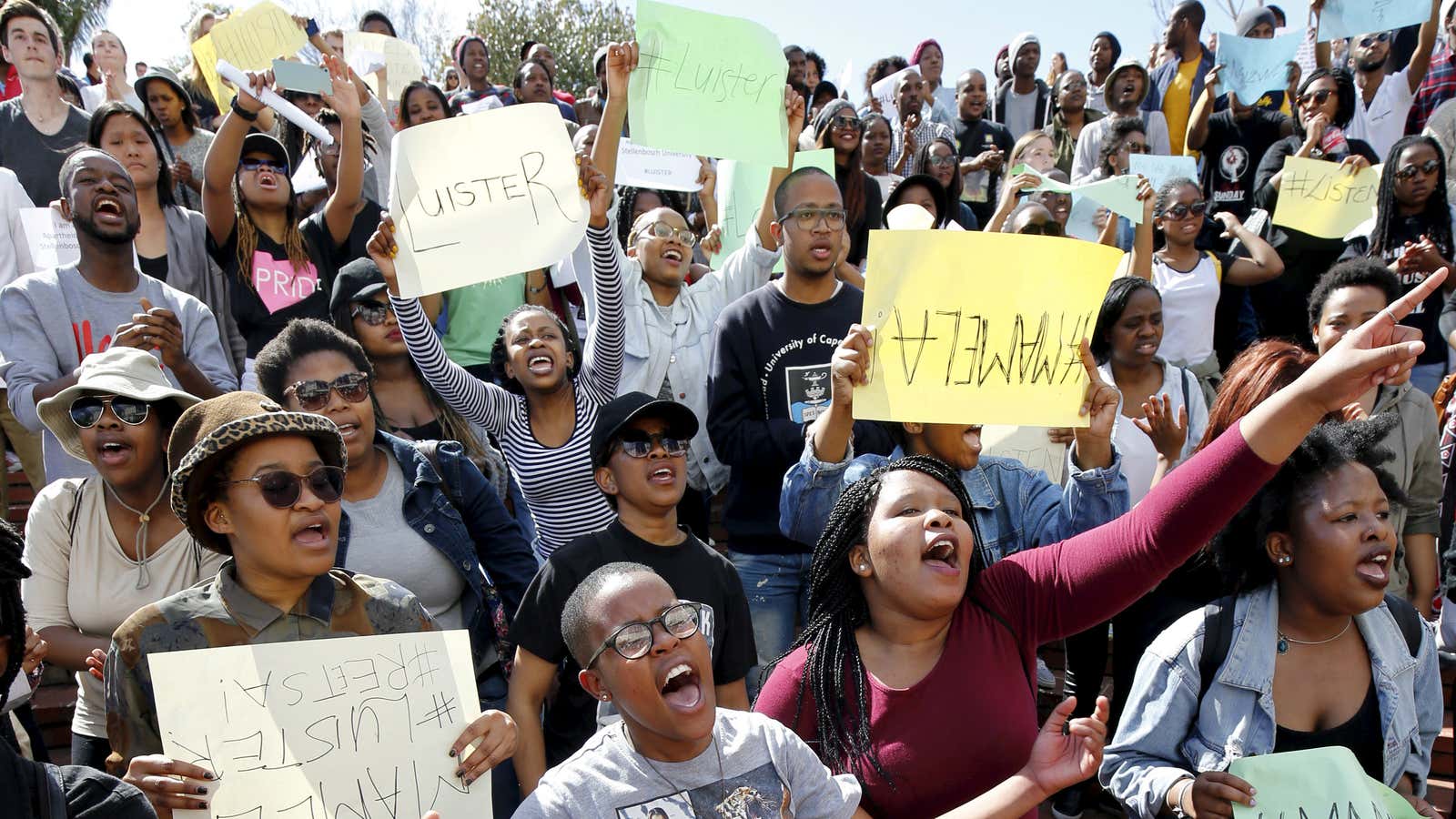Penny Sparrow, the woman whose name has become synonymous with racism, was born in 1947, on the eve of apartheid. Her entire life and that of her peers, one imagines, was spent in exclusive ‘whites only’ spaces where blacks were not allowed in, except, perhaps, as cheap labour to clean after and take care of their homes and to rear their children.
This is Penny Sparrow’s South Africa and it is this same exclusive environment in the post-1994 moment, whether in economic terms or social and spatial arrangements that continues to inform much of the views of “white South Africa”.
“White South Africa” is a useful construct for bigots who want to perpetuate learned forms of institutional racism and who feel entitled to exclusive access to certain privileges (such as a public Durban beach), also, by extension, a right to open racial bigotry as we have seen on social media from the likes of Sparrow, Justine Van Vuuren, Chris Hart of Standard Bank and Nicole de Klerk.
The social media backlash to these people is not only necessary but it must be seen as only a beginning in rooting out prejudice (racism, sexism, homophobia and transphobia), firstly, in the social contract we have among ourselves as citizens but also, and quite urgently, it must be dismantled as a socio-politico-economic structural hegemony which oppresses one group in favor of another.
Although one is tempted to single out Penny Sparrow as the chief bigot in this country one ought to exercise restraint for she is but a drop in the sea of many. There was Dianne Kohler Barnard of the South Africa opposition party Democratic Alliance, who recently praised P.W. Botha for his outstanding government, which delivered “public services” and good “health care” for, again, this same minority “white South Africa.”
From where I stand Dianne Kohler Barnard’s stance is even more insidious for she is not merely shooting off a racial slur but she is advocating the systematic genocide of blacks by a ruthless regime so that she may have exclusive access to “public services” and good “health care.” What, again, of the comment made by former apartheid president F.W. De Klerk who recently defended apartheid as having been a good idea that was executed badly? What of his recent comments about Cecil John Rhodes at Oxford?
It has become more evident, especially after the passing of Nelson Mandela, that the majority of “white South Africa” would prefer it if things were as they were during apartheid; that, although they still enjoy so much unearned privilege in a country where millions of blacks are barely surviving somewhere way below the poverty line, it is not enough. We must not, then, take lightly the fact that 1994 did not so much transform South African society but instead only transformed black rage into forgiveness towards whites who had visited – and still do – unimaginable human suffering and degradation upon their fellow countrymen.
Looking back at the post-1994 project of imagining and building a new nation, it would have set us on a right path of racial unity had we begun with reparations before reconciliation for, in the present moment, the legacy of institutional racism of our colonial apartheid past, as well as the current organization of structural oppression have all but landed on the black body.
The words of Penny Sparrow and her ilk only rub salt into that wound, thus exacerbating the historic humiliation and perpetuating the dehumanization that black South Africans have lived with for so long. It is then hardly surprising, given the decline of race relations in the recent years and the words of Sparrow that a local civil servant Velaphi Khumalo, stung by Sparrow’s racist vitriol would, in return, find somewhere deep inside him a place of equal hate for her and all whites, which he found in the most unlikely of places, in Hitler’s hate for Jewish people.
Such is the temperature of white racism and black rage in 2015 South Africa and it doesn’t help that people like Sparrow are so indifferent to their prejudice as to call their false racist apprehension of another human being a mere ‘fact.’
So where to from here? On the one hand I’m tempted to agree with constitutional law Scholar and writer, Pierre De Vos, on legislating racism away. However, I think that criminalizing racists acts (words and actions) is only treating the symptom of a malaise that runs deeper into the very way in which South African society is organized, in which one group occupies a space of absolute privilege in society while the other struggles to make ends meet.
So, perhaps, the best way to deal with racism is by dismantling the infrastructure that reproduces it. The direct implication of such an approach would be that all land (and the minerals buried beneath it) must be returned to its rightful owners—the black majority—and that all wealth from South Africa’s natural resources must be shared equitably.
This, of course, would require political will on the part of the South African government and personal integrity on the part of those who are hoarding the country’s wealth for themselves. The thought reminds me of Prof. Njabulo Nebele’s 2000 Steve Biko Lecture ‘Iph’indlela? Finding a way through confusion’ where he stated: “If South African whiteness has an opportunity to write a new chapter in world history it will have to come out from under the umbrella of international whiteness and repudiate it. Putting itself at risk, it will have to declare that it is home now, sharing in the vulnerability of other compatriot bodies. South African whiteness will have to declare that its dignity is inseparable from the dignity of black bodies.”
In this way we are either all ‘monkeys’ or we’re all people. Isn’t this what is meant by that post-apartheid buzzword, ‘equality’?
